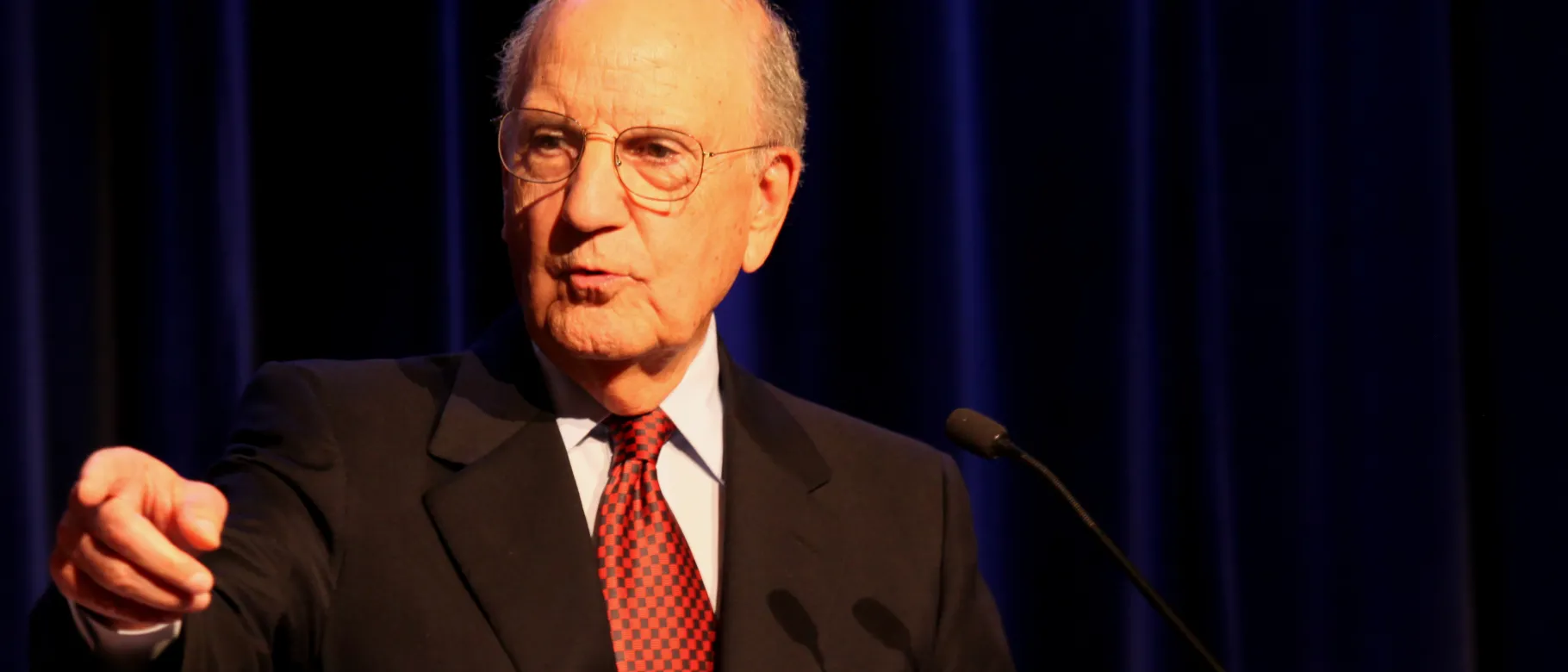George Mitchell discusses path to Middle East peace at UNE’s Tangier Global Forum

“Today on television news and in social media, there are many who comment that the world is falling apart, it’s more dangerous than ever and the United States is declining at home and abroad. I disagree on all counts.”
With those hopeful words, Senator George Mitchell set the tone for his impassioned and hopeful lecture, “Is Peace Possible in the Middle East?” delivered at the University of New England’s campus in Tangier, Morocco.
Mitchell explained the history of upheaval in the Middle East, beginning with the divide between Sunnis and Shia, which has led to increasing hostility between Saudi Arabia and Iran, and continuing with violence in nations such as Iraq, Syria and Yemen. “What most people in the Muslim world want is what most people everywhere want – a stable and a secure society, a decent job, a home, a chance to get their children off to a good start in life.”
Mitchell asked the world to be patient, reminding them that Europe experienced centuries of conflict before establishing peace. He said that a peaceful resolution of the Israeli Palestinian conflict would be a vital step toward peace for the region. “My hope is that Israelis and Palestinians will weight the risks of further delay or further inaction against the benefits of an agreement, however imperfect each of them might see it.”
Mitchell also emphasized the need for shared responsibility in achieving peace in the Middle East, pointing out that the U.S. cannot be held solely responsible.
Mitchell served as U.S. Senator from the state of Maine from 1980 to 1995, and as Senate Majority Leader from 1989 to 1995. For his role in forging the Northern Ireland peace agreement, he received the National Constitution Center’s Liberty Medal as well as the Presidential Medal of Freedom. In accepting the former award, he opined, “I believe there’s no such thing as a conflict that can’t be ended. They’re created and sustained by human beings. They can be ended by human beings. No matter how ancient the conflict, no matter how hateful, no matter how hurtful, peace can prevail.”
The story of Mitchell’s lecture in Tangier was picked up by several media outlets in Africa and the Middle East, including Hespress, Medi1 TV, Elaph, the Moroccan Press Agency, Morocco World News, Uncova, allAfrica, Africa-News, Gulf Times, 2M and Le 360. Morocco’s international television station, Medi1 TV, dedicated a half-hour segment to Mitchell, interviewing him about U.S. relations with Arab nations and promoting his lecture at the Tangier Global Forum.
The Tangier Global Forum has attracted diverse audiences of community members and students since its debut last fall. Mitchell’s lecture will be the eighth of the academic year for the series, following such topics as the challenges facing the Arab world, the birth of monotheism, and how the lessons of the Enlightenment might be applied to the greatest challenges facing humanity today.
Read an article in the Bangor Daily News.
Read and article from the Free Press.
Read an article about the lecture from Hespress (in Arabic).
To learn more about the Tangier Global Forum, visit www.une.edu/tgf
To learn more about UNE Morocco, visit www.une.edu/morocco
To apply, visit www.une.edu/admissions